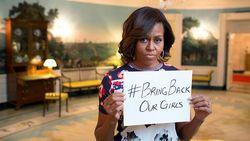Marc Barnes on #hashtag campaigns:
What are we to make of these “campaigns”? What are we to call it when those who cannot or will not act directly and immediately against a perceived moral evil nevertheless create a “movement” against it with t-shirts, bumpers stickers, memes, and millions of dollars? Of course it is not all bad — these movements raise money and donate it to other people who can act. These movements may touch the heart of someone who is willing to sacrifice more than his Facebook status. But it is not all good,
either. “Awareness” can sidetrack the energy and passion which serves as necessary propellant for action. “Talking about” Joseph Kony with fervor and righteousness can feel a whole lot like doing something — and thus be the very mode by which we do nothing at all. Or, as in the case of the #BringBackOurGirls campaign, a well-intentioned outcry against a moral evil can bring “free publicity” to criminals who want just that — to be talked about without being acted upon.
But considered outside of its total effects, considered instead as a personal act, what is the essence of hashtag activism, this social-media campaigning that does not involve getting up from the laptop?
It is a post-Christian replacement for prayer.
Prayer is a fundamentally human reality. There is no culture on earth that does not participate in some form of prayer, petition, worship, praise or sacrifice, seeing the events of the world and of their lives as interwoven in the life of a deity. The removal of prayer from a human life is not akin to dropping a particular eating habit. Prayer is integral, primordial — it will have to be replaced.
This is the modus operandi of American secularism, and perhaps of secularism in general. We introduce new forms of the religious rituals we discard. Holy days become holidays, Valentine’s Day persists without St. Valentine, churches become museums, fasting becomes dieting, almsgiving becomes philanthropy, and the sacrament of confession is replaced by the “tell-all insincerity” of pseudo-therapy.
St. Therese of Liseux says “prayer is a surge of the heart; it is a simple look turned toward heaven.” The “activist” hashtag is certainly a surge of the heart. It is an articulated, emotional response to a perceived evil. And it is, beyond doubt, “turned towards heaven” — a lesser heaven populated by lesser gods.
Sharing and spreading Kony2012, #BringBackOurGirls and movements of similiar ilk cries out to a general “higher power.” There is no specific plan of action. Michelle Obama, married to the most powerful man on earth, could hold up the hashtag without irony for precisely this reason — the tweet calls on “someone, somewhere” to take action, not a particular person.
Mr. Barnes has much more, all of it insightful, all of it worthy of your efforts to read it.
#Justdoit. #Youwontregretit
Perhaps we should be promoting #hashtagsANDprayer.
Maybe.
 either. “Awareness” can sidetrack the energy and passion which serves as necessary propellant for action. “Talking about” Joseph Kony with fervor and righteousness can feel a whole lot like doing something — and thus be the very mode by which we do nothing at all. Or, as in the case of the #BringBackOurGirls campaign, a well-intentioned outcry against a moral evil
either. “Awareness” can sidetrack the energy and passion which serves as necessary propellant for action. “Talking about” Joseph Kony with fervor and righteousness can feel a whole lot like doing something — and thus be the very mode by which we do nothing at all. Or, as in the case of the #BringBackOurGirls campaign, a well-intentioned outcry against a moral evil 